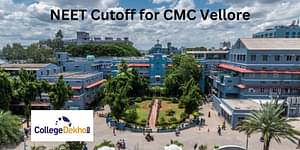DM Gastroenterology
DM Gastroenterology Overview
Doctor of Medicine in Gastroenterology is a post-doctoral degree commonly known as DM. As with all post-doctoral courses, it can be pursued after completing post-graduation, provided it is in medicine. The overall course duration of DM Gastroenterology is three years in India. The medical colleges of various administrations offer the course through the NMC-authorised seats. These seats can be applied for by using the NEET-SS entrance examination, which is again administered by the NMC for medical courses.
Gastroenterology is the study of the human digestive system, and it is a sub-specialisation of the internal medicine branch of medical sciences. Though there is no specialisation available in Gastroenterology, being a speciality course, students can opt for DM Hepatology, which is the study of the liver.
DM Gastroenterology is one of the highest levels of qualification that can be attained in medical sciences. Students can unlock all types of career opportunities with it. Some of the top Indian medical colleges to study the course are Banaras Hindu University, Sawai Man Singh Medical College, and Christian Medical College. The annual average cost of pursuing the DM Gastroenterology course in India can range from INR 1,500 to over INR 60,00,000 annually depending on the type of institution chosen.
Table of Contents
- DM Gastroenterology Overview
- DM Gastroenterology Course Highlights
- Why Choose DM Gastroenterology?
- DM Gastroenterology Courses Entrance Exams
- DM Gastroenterology Courses Eligibility Criteria
- How to Get Admission to DM Gastroenterology Courses in India?
- Popular DM Gastroenterology Colleges in India
- DM Gastroenterology Study Abroad
- What is DM Gastroenterology Course Fee?
- DM Gastroenterology Syllabus
- DM Gastroenterology Scope in India - Career and Job Prospects
- What is DM Gastroenterology Graduates’ Salary?
- Required Skills to Become a Gastroenterologist
- FAQs about DM Gastroenterology
DM Gastroenterology Course Highlights
DM Gastroenterology course is one of the most prestigious courses of medical sciences, both in terms of qualification and streamwise. Here are some of the important characteristics of the course that students should be aware of to get more familiar with the course:
Full Form |
Doctor of Medicine in Gastroenterology |
|---|---|
|
Level |
Postdoctorate |
|
Stream |
Internal Medicine, Life Sciences |
|
Exam Type |
Semester |
|
Types of Courses |
Full-time |
|
Duration |
3 years |
|
Minimum Qualification Required |
Postgraduate in Gastroenterology |
|
DM Gastroenterology Selection Process |
National Entrance Exam |
|
DM Gastroenterology Top Entrance Exams |
NEET-SS Entrance Exam |
|
Average Annual Course Fees |
INR 1,500 - INR 60,00,000 |
|
Top Medical Colleges |
BHU, SMS Medical College, CMC Vellore, and Dr D Y Patil Medical College |
|
Career Opportunities |
Gastrointestinal Oncologist, General Gastroenterologist, Clinical Trialist, and Scientist |
|
Average Annual Starting Salary |
INR 5,00,000 - INR 90,00,000 |
Why Choose DM Gastroenterology?
DM Gastroenterology course can prove highly beneficial for its graduates. However, mere words cannot be used to dictate the supremacy of the course. Students shall require more elaborate descriptions of how the course can be helpful. Hence, here are some of the arguments in favour of the DM Gastroenterology course:
- Reputable Course: The course not only provides a PhD degree but it also is of the highest cadre of courses in the medical sciences. Students must have already completed their MBBS and MD or MS when applying for the course. The qualification level of the course is naturally high and hence highly reputable. On completion of the course, graduates can easily expect themselves to be considered in high regard.
- High Salary: Any course’s reputation is in direct proportion to the offered remuneration. As already established, the DM Gastroenterology course is highly reputed in the medical sciences field. Recruiters are ready to pay millions to students to complete their course of study. Even, as fresher, they shall be so well qualified that they can easily negotiate a high level of salary within the standards of any market or country.
- Medical PhD: PhD courses are all highly qualified. To pursue them, only students need to complete their bachelor’s and master's levels of education. DM Gastroenterology is also a post-doctoral qualification course, that is it is equivalent to general PhD courses in qualification. Hence, it can be understood as one of the many medical PhDs. The students can unlock all the benefits and perquisites of completing PhD courses by pursuing DM Gastroenterology courses.
- Prosperous Career Scope: The qualification, remuneration, skills, and overall course reputation allow students to have a chance at prosperous career options. They can pursue the paths reserved for PhD students as well, which means that they can unlock all possible career paths in medical sciences after completing the DM Gastroenterology courses, including becoming a scientist.
- Social Service: As a Gastroenterologist, students can help various common people overcome their diseases and problems. Additionally, a stable and consistent income will also allow them to take up volunteering projects and cater to weaker sections of society free of cost. Medical science is one of the fields that are directly associated with social good and welfare, the course will give mental and financial freedom to its students to take the chance of widening the scope of social services.
DM Gastroenterology Courses Entrance Exams
To get admission to DM Gastroenterology courses in India, students need to appear for the NEET Super Speacilaity (NEET-SS) entrance test.
The NEET exam is a national-level entrance test conducted by the National Medical Council or NMC for admission to medical colleges in India. The exam is conducted on multiple levels based on qualification, such as NEET UG, NEET PG, NEET Speciality, etc. NEET Super Speciality exam is conducted for admission to all the DM courses approved by NMC across India.
Medical colleges select their cut-off score for admission and use the same to provide admission to applicants. There is a system of Quota applicable to the selection of students for the seats allotted for DM Gastroenterology courses.
There are a total of 218 seats authorised by the NMC for DM gastroenterology courses in India. The NEET-SS exam has to be attempted by all the students who wish to apply for any of these seats.
The general NEET-SS cut-off structure for admission to DM Gatsroenetrology courses is defined below:
Quota of Admission |
NEET SS Cut-off Score |
|
|---|---|---|
|
Highest Starting Limit |
Lowest Closing Limit |
|
|
All India Quota |
340 |
237 |
|
Management Quota in Deemed Universities |
291 |
170 |
In the Deemed Universities, students will find that there are other seats available than those listed in the NMC’s list. These seats are listed by the virtue of awarding NMC’s authorisation to the private university’s courses and are hence disposed of by the university into the body’s service. This is why they are known as the Management Quota seats.
While the university has no control over the admission of students for these seats, NMC does not exercise control over admission for other seats of the university.
DM Gastroenterology Courses Eligibility Criteria
In India, the eligibility criteria for admission to any course type are mostly short and crisp. Students need not go through extensive processes to apply for admission. However, that much strictness is applied to the adherence to these eligibility criteria. Students often do not have any alternatives to the criteria and need to fulfil the admission process.
The same is the case for DM Gastroenterology courses as well, especially as they are speciality courses of high qualification level. To apply for the seats available for the DM Gastroenterology courses in India, students must:
- have completed their master’s degree or postgraduate course, that is they have a degree of MD or MS, in the relevant subject,
- have completed their MBBS degree of five years as well, and
- have to clear the cut-off score in the NEET-SS entrance examination.
In the case of an MBBS degree, the waiver is available based on an MD or MS degree.
Since, certain BSc courses can be used to apply for MS courses, along with NEET PG entrance examination scores, the requirement of an MBBS degree is waived in this case. However, the student needs to have an additional postgraduate degree in this case, either in the form of DNB Gastroenterology or MD Gastroenterology.
How to Get Admission to DM Gastroenterology Courses in India?
The whole admission process to DM Gastroenterology courses in India has been given below:
Step 1: Complete the 10+2 education in Physics, Chemistry, and Biology subjects. Appear for the NEET-UG entrance examination.
Step 2: Apply for an MBBS degree with an Indian medical college based on NEET-UG scores. Complete the course study of five years.
OR
Apply for the relevant BSc course which allows pursuing Gastroenterology courses in the future.
Step 3: Prepare for the NEET-PG entrance examination, and use the scores of the same to apply for MD or MS courses in Indian medical colleges.
OR
If you have completed a BSc course, complete a PG Diploma in Gastroenterology and then use NEET PG scores to apply for MS or MD courses.
OR
Apply for an MS Gastroenterology course with NEET-PG course, and on completion, apply for an MD Gastroenterology course.
Step 4: Complete the MD or MS Gastroenterology course of two to three years, as the case may be. Appear for the NEET-SS entrance examination.
Step 5: Use the NEET-SS scores to apply for admission to DM Gastroenterology courses.
Step 6: Await the email of enrollment confirmation or the admissions list.
Note: DNB Gastroenterology is a prestigious postgraduate programme and can be pursued after MBBS or MS, as the case may be.
Popular DM Gastroenterology Colleges in India
Some of the best Indian colleges offering DM Gastroenterology courses are listed below:
Name of College |
Annual Tuition Fees (in INR) |
|---|---|
|
GB Pant Institute of PGMER, Delhi |
25,000 |
|
Institute of Medical Sciences BHU, Varanasi |
40,000 |
|
Indira Gandhi Institute of Medical Sciences, Patna |
40,000 |
|
SMS Medical College, Jaipur |
20,000 |
|
Seth GS Medical College, Mumbai |
62,000 |
|
Christian Medical College, Vellore |
20,000 |
|
NHL Municipal Medical College, Ahemdabad |
6,00,000 |
|
Dayanand Medical College, Ludhiana |
2,10,000 |
|
St. Johns Medical College, Bangalore |
9,00,000 |
|
Meenakshi Medical College, Kanchipuram |
20,00,000 |
|
Dr. D Y Patil Medical College, Pune |
50,000 |
|
Kasturba Medical College, Manipal |
26,00,000 |
Note: All government quota seats will carry an annual tuition expense of INR 1,500.
DM Gastroenterology Study Abroad
DM Gastroenterology courses can also be pursued abroad by Indian students. There are various foreign universities whose reputed medical colleges not only offer study but, further career opportunities as well. Since the DM Gastroenterology course is a post-doctoral, students can also apply for prestigious government and university-based scholarships and fellowships to study abroad. The annual tuition expenses to study the course abroad, without any financial support, can range from INR 60,00,000 to INR 1,20,00,000, which is at least three to five times the educational cost in India.
Here are some of the reputed foreign institutions which offer the DM Gastroenterology courses to international students:
Name of the University |
Country |
|---|---|
|
University of Oxford |
UK |
|
Yale University |
USA |
|
University of Toronto |
Canada |
|
Karolinska Institutet |
Sweden |
|
The University of Melbourne |
Australia |
|
National University of Singapore (NUS) |
Singapore |
|
London School of Hygiene and Tropical Medicine |
UK |
|
The Chinese University of Hong Kong |
Hong Kong SAR |
|
Seoul National University |
South Korea |
|
KU Leuven |
Belgium |
|
Baylor College of Medicine |
USA |
|
National Taiwan University |
Taiwan |
|
Kyoto University |
Japan |
|
University of Milan |
Italy |
|
University of Cape Town |
South Africa |
What is DM Gastroenterology Course Fee?
The tuition fees for a DM Gastroenterology course in India are dependent on the type of institution which is offering the course. While all medical colleges offer the course for a three-year duration, the fee structure is based on their founding aims. For instance, government medical colleges are solely set up to cater to the education prosperity of the nation.
Hence, to allow access to students from all economic backgrounds, the fee structure is designed as highly affordable. On the other hand, private medical colleges are set up to earn profit and they use expensive and high-tech medical equipment, whose operational costs are very high, hence, their fee structure is often unaffordable for students of weaker economic backgrounds.
Here is an observed course fee pattern of DM Gastroenterology courses in India:
Types of Institutions |
Annual Tuition Fees (in INR) |
|---|---|
|
Government Colleges |
1,500-6,10,000 |
|
Semi-Government Colleges |
2,10,000-6,10,000 |
|
Private or Deemed Universities |
10,00,000-30,00,000 |
DM Gastroenterology Syllabus
Here are the subjects or disciplines taught over the three-year duration of DM Gastroenterology courses in India:
Biology of Gastrointestinal Tract & Liver |
Approach to Patients With Symptoms and Signs |
Nutrition |
|---|---|---|
|
Esophagus |
Stomach and Duodenum |
Pancreas |
|
Biliary Tract |
Liver |
Small & Large Intestine |
|
Psychosocial Factors |
Topics Involving Multiple Organs |
History, Examination & Writing of Records |
|
Bedside Procedures and Investigations |
Upper GI Endoscopic, Colonoscopic & ERCP Procedures |
Gastroenterology Teaching - Clinical, Investigations & Procedures |
DM Gastroenterology Scope in India - Career and Job Prospects
Once a student completes their DM Gastroenterology course, they can pursue a career in any of the following directions:
- Medical Gastroenterologist: If the DM course has been completed in Medical Gastroenterology, then they can pursue a career as a specialist in the same. They can apply for jobs with hospitals, medical colleges, forensics, research centres, etc.
- Gastroenterology Surgeon: As a surgeon, Gastroenterologists can perform surgeries, which is a very specialised and restricted field even in medical sciences, due to the nature of responsibility and risk inherent. Their need in hospitals and forensics is huge, though the job opportunities are not at all limited to these places.
- Scientist: There is a constant requirement for specialised scientists to work on advancing the scope of any study. Gastroenterology is also the same, and hence, the demand for professionals, especially those with a post-doctorate degree is never-ending.
- Gastroenterology Professor: The quality of future talent is highly dependent on competent teachers. Graduates of DM Gastroenterology can opt to dictate their lives to ensure that the quality, sanctity, and professionalism of the stream are safe by honing the students in the manner appropriate for the discipline.
What is DM Gastroenterology Graduates’ Salary?
The salary of DM Gastroenterology is highly dependent on the job profile and experience. Yet, they can easily expect themselves among moderate to high earners in the Indian economy.
Here are some of the job profiles of DM Gastroenterology course graduates and their annual salary:
Job Profiles or Placements |
Annual Salary (in INR) |
|---|---|
|
Clinical Trialist |
6,00,000-10,00,000 |
|
GI Physiology Specialist |
10,00,000-80,00,000 |
|
General Gastroenterologist |
9,00,000-20,00,000 |
|
Gastrointestinal Oncologist |
20,00,000-90,00,000 |
|
Hepatologist |
15,00,000-35,00,000 |
|
Nutrition Specialist |
5,60,000-12,00,000 |
|
Scientist |
5,00,000-18,00,00 |
Required Skills to Become a Gastroenterologist
In order to make a successful career out of Gastroenterology students need to have certain qualities which help them adhere to their profession’s demands. Some of the most important qualities for a Gastroenterologist to have are:
- Relevant Skills: The most important skills to have are relevant professional skills, that is the medical knowledge required to meet professional responsibilities. These skills are acquired by a Gastroenterologist by successfully and diligently completing their course of study, from 12th to DM Gastroenterology course.
- Critical Thinking: Since the lives of their patient are dependent on their actions, Gastroenterologists need to have critical thinking abilities. They require them to draw inferences relevant to the patient’s current status and run the medical procedures accordingly required. Eventually, the test result interpretation and subsequent course of action shall also require the same skill set.
- Leadership and Managerial Skills: Gastroenterologists have a team of people working either directly or indirectly under them. In both cases, they need leadership and managerial skills to ascertain what task needs to be delegated to whom. In the case of indirect authority, delegation and leadership only become more complicated, and they need to figure out how to get their work done while ensuring to not enter into conflicts with other specialists or team members.
- Research and Scientific Mindset: As graduates of a post-doctoral programme, it is expected that Gastroenterologists make efforts and time to work on advancing the existing techniques, methods, and other disciplinary aspects of Gastroenterology. They may get involved with the hospital, medical college, or research centres with whom they are affiliated for work or research.
- Service Mindset: While the strenuous nature of medical studies is clear, the job is also not devoid of it. In fact, with progress in studies and career, the time limits vanish, and to cope with the same positively medical practitioners, including Gastroenterologists require a strong sense of service. Hence, it is advised time and again to medical students develop the sense and devote themselves to the cause of a medical doctor to live their life positively despite their demanding job.
FAQs about DM Gastroenterology
Is DM Gastroenterology degree the same as MD Gastroenterology degree?
No, DM Gastroenterology degree is not the same as MD Gastroenterology. DM Gastroenterology is a post-doctoral degree, that is you will need to have an MD or an MS to pursue it. On the other hand, MD Gastroenterology is a graduate degree of a master’s level. The DM Gastroenterology course is a three-year programme that is equivalent to a PhD.
Can DM Gastroenterology graduates perform surgery?
No, DM Gastroenterology course graduates are not entitled to perform surgeries. To perform surgery students need to pursue a course in surgical sciences. All other speciality courses will help them gain a professional degree as a specialist and a diagnostic doctor. Hence, DM Gastroenterologists as well can perform relevant diagnostic procedures, such as colonoscopy, but cannot perform surgery.
What is DNB Gastroenterology?
DNB or Diplomate of National Board is a postgraduate degree awarded by the National Board of Examinations (NBE). The degree is equivalent to an MD or MS degree and is awarded to selected candidates. Every year, NBE selects three students for each of the two DNB Gastroenterology courses, namely Medical Gastroenterology and Surgical Gastroenterology.
Is DNB Gastroenterology related to the DM Gastroenterology course?
Yes, the DNB Gastroenterology degree is related to the DM Gastroenterology course. While the former is a prestigious post-graduate degree awarded by the NBE, the latter is a post-doctoral degree in the same discipline. As a norm, you need to have an MD, MS, or equivalent degree to pursue DM degree courses. DNB Gastroenterology being an MD/MS equivalent degree can be used to pursue a DM Gastroenterology course.
Is the DM Gastroenterology course a PhD course?
Yes, the DM Gastroenterology course is a PhD equivalent course. The course is a post-doctoral degree and gives graduates a qualification status the same as the PhD courses. It is a three-year course in opposition to the usual six to eight-year-long PhD courses. The course deals with the study of the human digestive system.
Is DM Hepatology better than DM Gastroenterology?
It cannot be said that DM Hepatology is better than DM Gastroenterology. Hepatology is a study of the human liver, which is an organ included in the human digestive system. This makes DM Hepatologya a sub-speciality of DM Gastroenterology. Hence, the two cannot be compared for the person studying Hepatology needs to have a basic and working knowledge of Gastroenterology.
How many seats are available for the DM Gastroenterology course?
The number of seats available for DM Gastroenterology courses in Indian hospitals and colleges coming under the jurisdiction of the National Medical Council (NMC) is 218. These seats are filled based on NEET speciality entrance examination scores. There are certain quotas applicable to the filling process of the said seats. There is a cut-off score that needs to be cleared to get admission to each of these seats.
What is the parent stream of DM Gastroenterology courses?
The parent stream of DM Gastroenterology courses in Internal Medicine and Human Physiology. The study is concerned specifically with the human digestive system. Students can pursue the speciality course in two types, namely medical and surgical. DM in Surgical Gastroenterology will lead them to become surgeons specialised in handling cases relevant to the field.
Can I become a medical practitioner abroad after completing my DM Gastroenterology course?
Yes, you can easily become a medical practitioner abroad after completing your DM Gastroenterology course. You need to research the eligibility criteria for practising as a medical practitioner in your chosen country. Additionally, you also need to prepare for the test conducted by the country to award the license to practice. You will have to prepare for and clear the same to achieve your goals.
What is required to earn well after completing the DM Gastroenterology course?
The most important thing required to earn well after completing the DM Gastroenterology course is your academic performance and skills. If you have these two, you can build a prolific career, especially as you gain experience over the years. It is quite recommended that you choose to pursue the DM Gastroenterology course, as it is one of the highest and most reputed medical courses in India.
Popular Courses
- Courses
- DM Gastroenterology


















